Horse Trailer Buying Guide: What You Should Know
Horse Trailer Buying Guide: What You Should Know
Investing in a horse trailer is a crucial step for any horse owner, whether they ride competitively or just for pleasure on occasion. As there is a wide variety of horse trailers on the market, it can be difficult to choose the one that is best for your needs.
You want to make sure that the trailer you choose will provide comfortable transportation for both you and your horse when you begin your search for the ideal one. Numerous elements, including size and type, must be taken into account.
Having accurate information is crucial for making an informed decision when looking around for the ideal horse trailer. This guide will cover all the essentials of buying a horse trailer, including topics like types of trailers, features to look for when shopping for a trailer, safety features, materials, maintenance, pros and cons, and more, to make your search process for the perfect trailer easier.
New vs. Used Horse Trailer: What’s The Best Choice?
As we’ve already discussed, a horse trailer is essential for any horse owner. But as soon as you decide you need one, the next question that comes to mind is, new or used? Horse trailers tend to be expensive, and the best solution is by no means one-size-fits-all. Before settling on a purchase, assessing new and used models are necessary to evaluate your options.
Choosing between a new and a used horse trailer can be difficult. Both have their benefits and drawbacks, and understanding how each might fit into your budget and lifestyle is key to making the right choice for you. To help identify which option will work best for your needs, let’s explore the advantages and disadvantages of purchasing new or used horse trailers.
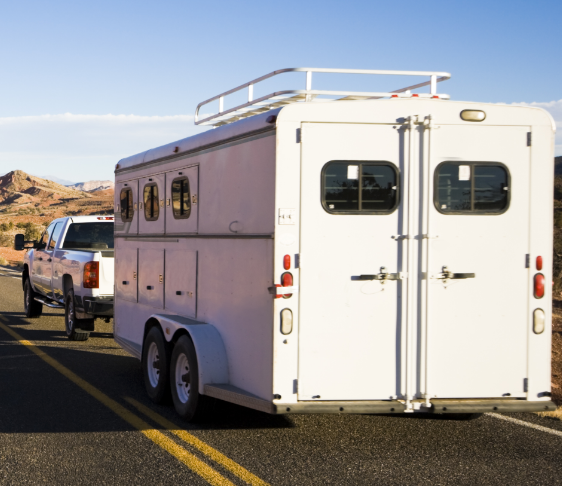
Buying a New Horse Trailer
Buying a new horse trailer will depend on factors such as your budget, the durability of the material and design, the features offered by various types of trailers, and the experience you want to have while traveling with your horses.
Pros of a New Horse Trailer
– Newer technology for safety
– Durability and longevity of the trailer can be guaranteed
– Additional features such as living quarters, tack room, shower, etc., may not be available in used trailers
– Easier to get a custom horse trailer with a brand-new trailer.
Cons of a New Horse Trailer
– Initial cost to purchase new is expensive
– Depreciation on value if needing to resell
– Limited customization options with new models as compared to used ones
Buying a Used Horse Trailer
Used horse trailers can be a great way to save on costs, but it is important to do research to make sure it is in good condition and able to meet your needs. Be sure to have the trailer inspected by a professional before purchase, as well as to obtain its repair history.
Pros of a Used Horse Trailer
– Cost is lower when purchasing used compared to buying new
– There is a wide selection of makes and models available in used trailers
– Don’t have to worry about depreciating the value quickly
– The monthly payments on a loan for a used horse trailer will be noticeably lower than those for a brand-new trailer.
Cons of a Used Horse Trailer
– Don’t know the condition of the trailer until you inspect it in person
– Harder to get a custom horse trailer and make adjustments such as adding living quarters or expanding cargo space
– May not be up to current safety standards
– Fewer warranty protections or money back guarantees from sellers and manufacturers.
The Best Value For Your Money
Ultimately, it comes down to personal preference and what best serves your current needs with regard to a new or used horse trailer. When it comes to the best value for your money, the answer is often found in used trailers. Used trailers can be a great way to save money and still get a quality trailer that will last for years. The key is to do your research and find out what features are important to you, and then shop around for the best deal. Your local horse trailer dealer, the horse trailer manufacturer itself, or the internet are all viable options for purchasing a horse trailer. But to avoid online scams, your best bet for finding a high-quality used horse trailer is to visit a horse trailer dealership and one that offers or accepts financing options as well.
Best Ways to Finance a Horse Trailer
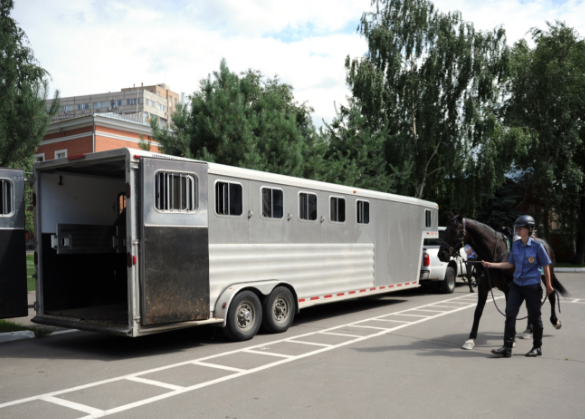
Worried about your budget but still need a horse trailer? Financing a new or used horse trailer is the best option for those horse owners that don’t have the funds to purchase one in one payment. Know that there are some options for financing.
Depending on the model, whether you buy it new or used, and the extras you want, the average price of a horse trailer can range from $5,000 to well over $100,000. Costs for bumper pull trailers average around $30,000, while those for gooseneck horse trailers are typically between $30,000 and $50,000. The most expensive choice is a living quarters-equipped gooseneck horse trailer, while a two-horse bumper pull trailer is on the more affordable end of the spectrum.
With those price ranges in mind, it’s important you shop around and compare rates from different lenders when thinking about financing. You should also consider the terms of the loan, such as the length of time you will be using them, the expenses involved (which depend on how many horses you will be transporting and for what,) and many other factors.
Southeast Financial
Whether you’re hauling horses for a competition or a mule to the mountains, a horse trailer is a necessary and worthwhile investment if you’re a horse owner. Lessen the impact of purchasing a new or used trailer with Southeast Financial.
It doesn’t matter if horses is only a hobby for you or a business, for the sake of your animals, you just can’t skimp on your trailer. But you can lessen the impact. With over two decades of experience helping horse owners and their transportation needs, Southeast Financial has learned a thing or two about choosing the right financial institution that will take your livestock or horses in a safe and fast way.
At Southeast Financial, we offer a fast service that will get you an online and secure approval decision in less than 24 hours. You’ll be offered outstanding rates and terms that can fit any budget consideration and hauling needs. Moreover, it doesn’t matter whether you’re going for an old or new horse trailer, a second party, or a dealer; we can work with any of those and get you financing.
There’s a vast array of trailers to choose from, and we can help you decide. Financing for any of your horse trailer needs.
Also, are you already paying too much for your horse trailer loan? Refinancing rates could be the ticket to a lower-priced loan, and you may be able to make more room in your monthly budget by extending your loan terms.
No matter if you’re transporting several thoroughbreds across the country for a barrel racing competition or just one Shetland pony for that kid’s party, you shouldn’t settle for second best. Furthermore, we can facilitate this for you.
Horse Trailer Financing That Fit Your Budget
Other Horse Trailer-Related Expenses
While the price, quality, and space differences between new and used horse trailers are essential and primary questions before choosing a horse trailer, several other related expenses can’t go unresearched by any horse owner. We’re talking about the additional cost of side view mirrors, models, maintenance costs, what type of insurance you need, and even a license to haul one around.
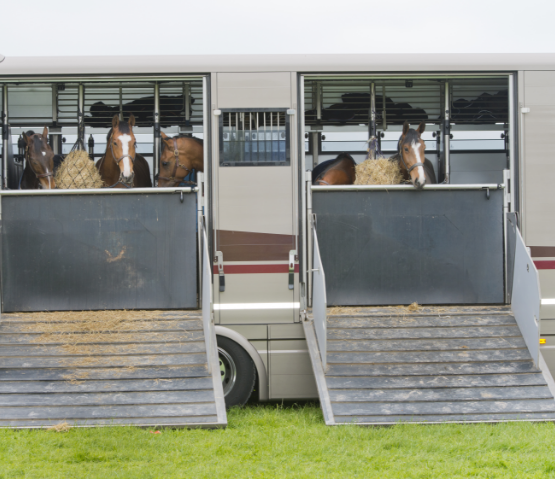
Commercial Class A License
Hauling around a horse trailer requires a license in most U.S. states and jurisdictions. In many states, you will also be required to show proof of insurance for your horse trailer before you can get a license or registration. Finally, make sure that the weight of the load does not exceed what is allowed by law; overloaded trailers can cause danger on the roads. So make sure you check your local DMV. The license cost is $10 to $80, depending on your state.
Side View Mirrors
You need side view mirrors for your horse trailer in order to have better visibility and reduce blind spots. The cost of side view mirrors may vary depending on the size, type, and features but generally range from $10 to over $400.
Hitch Installation
The cost of a hitch installation for hauling a horse trailer can vary depending on the type of hitch, the make and model of your vehicle, and other factors. Generally speaking, the cost of a basic hitch installation can range from $200- $2,000.
Breakaway System
For most trailer owners, the cost of a breakaway system for a horse trailer varies depending on the size and type of system needed and can range from $40 to $200 or more.
Insurance
Some states require insurance before giving you a license, but even if you live in one that doesn’t, insurance is essential to protect your trailer and livestock from damage. The cost of the policy will depend on different factors, such as the type of coverage you choose, the age and condition of the trailer, and where it is stored. To get an accurate quote for a horse trailer insurance policy, it is best to contact your insurance provider directly, although any coverage will be at least $30 per month.
Ongoing Repairs and Maintenance
You won’t escape the need for upkeep and repairs with a horse trailer. While it’s hard to put an exact number on what long-term maintenance on a horse trailer will cost, be assured that there will be expenses. Some types of trailers are typically less costly to maintain, like aluminum horse trailers. Used trailers will likely require more maintenance than brand-new ones, while the smaller trailers will be cheaper to repair and keep.
Finding the Right Horse Trailer For You
There are hundreds of models of trailers out there from minor and major trailer manufacturers, with different loading options, materials, floors, and other key features. But buyers of horse trailers will generally always know the five types of horse trailers they can choose from.
Bumper Pull Horse Trailer
A bumper pull horse trailer is a type of trailer that attaches to the back bumper of a tow vehicle. The vehicles used for bumper pull trailers are usually SUVs, vans, and pickup trucks. This type of horse trailer typically has basic features such as a side access door, interior stall pens or single-slot long-haul areas, and windows for ventilation and convenience. Bumper pull horse trailers can come in different sizes to accommodate the height and weight of horses, as well as additional features like a living quarter and tack storage space.
Gooseneck Horse Trailer
A horse gooseneck trailer is a type of trailer that is attached to the bed of a vehicle, typically a pickup truck. The attached hitch extends over the rear axles of the towing vehicle, allowing for greater stability and maneuverability. The interior of the trailer typically has stall areas for individual horses, tie hooks and slots for hay, feeders, and even wash stalls in larger models. Additionally, some have partitions so that more than one horse can be transported at a time. Gooseneck horse trailers generally have two access points on either side or at the rear end, creating plenty of space for loading and unloading horses. They have better stability and a smaller turning radius than bumper-pull horse trailers. These trailers are also a favorite for larger horses. Just remember that since gooseneck trailers are larger (have more space for a dressing room or living quarters) they are heavier, and thus will need a truck or towing vehicle with a higher towing capacity.
Living Quarters Horse Trailer
The living quarters trailer is designed with horse owners in mind, allowing them to trailer their horses in comfort and style. This horse trailer has all the key features you need for a great travel experience on the road. Most include a bed, sink, bathroom, and plenty of storage space. An upside to living quarters horse trailers is their customization in the floor plan. You can make a custom horse trailer floor plan and add everything you need to make yourself feel at home.
So whether you are taking your prized show horse(s) to the next competition or just out on the range camping with friends and family, this stylish LQ trailer is perfect!
Straight-Load Horse Trailer
In a straight-load horse trailer, the horse should be facing forward with its tail pointing backward. Horses can stand up and turn around in straight-load horse trailers thanks to their ample width. A straight-load trailer has a ramp at the back that makes it possible to load and unload the horse without having to lift and swing it. Numerous features, including padded walls, low ramps, multiple stalls, and adjustable partitions, can be added to these trailers.
Slant Load Horse Trailer
A slant load horse trailer usually has four sides that slope inwards to allow easier entry and exit of the horses. It also typically has an interior stall partitioned into three sections; two side-by-side stalls for two horses and one center section with small access doors where the third horse goes. The slanted walls in a slant load trailer provide more headspace than standard box trailer designs, making it a more comfortable ride for the animals. However, more and more horse owners are disputing this common perception about slant load trailers. Slant load trailers are used extensively by event riders, endurance races, and even recreational riders and owners who want to travel closely with their horses.
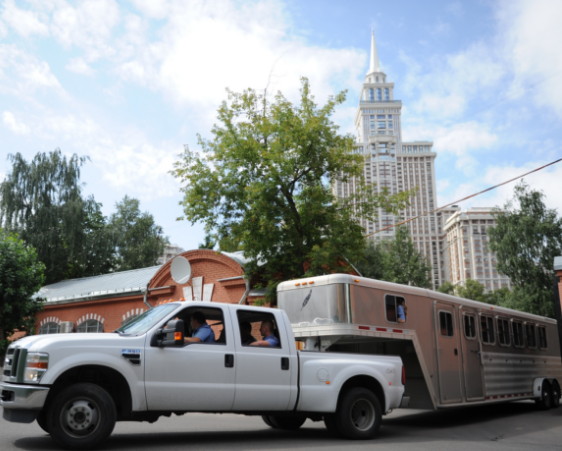
Horse Trailer Materials
Horse trailers are costly because they have to be built to withstand long overnight trips over rough terrain without causing any harm to the horses inside. Axles must be heavy-duty, the exterior must be sturdy, roof must be lined and insulated, and the structure must be sound, all of which add up in price. The materials the structure is made of are crucial, with aluminum and steel being the two most common options, both with pros and cons.
Aluminum
Among the top advantages of an all-aluminum trailer, which is the more typical exterior material, are that they’re lightweight, so they require less horsepower to tow, and that they’re good against corrosion and rust. Aluminum horse trailers also are more affordable than steel.
A problem with an all-aluminum trailer, though, is its safety, as they’re less rigid and risk flexing on uneven surfaces. Vibrations from the road can also dent aluminum easier and rattle the horse frequently.
Steel
Steel trailers will be more reliable, durable, and safer than aluminum trailers but also more expensive. They will also be much heavier to tow and will drink up your gas at a faster pace because of that. Steel frame horse trailers will also require maintenance to keep them in good shape.
Flooring Materials
The materials of your horse trailer floors are just as important as the material outside. Think about what’s best for your horse when loading, unloading, and when being transported, but also think about your budget and how much you’re willing to spend on floor maintenance. The most common and available options for flooring materials are:
- Wood flooring, which is the most traditional, second-most affordable, and reliable, but also costly to maintain and prone to moisture, scratching, and termite damage.
- Aluminum flooring is resistant to moisture and scratching and easy to maintain and clean. But it can be noisy and slippery for both owners and horses, as well as dangerous in extreme weather because of its conductivity. If not kept properly, it can also rust and corrode easily.
- Rubber flooring is a durable and anti-slip material, which is great for horses and owners. One of the key features of rubber is being noise and shock-absorbing, and it comes in a variety of colors and styles. Plus, it’s easy to install. However, it’s among the most expensive flooring options for horse trailers. Rubber can also emit a strong chemical smell after installation, which can nauseate the animals and owners. Replacing it can also be cumbersome.
- Polylast flooring can be the most durable, non-slip, noise-suppressant, and best insulating flooring available for horse trailers, but it can also be the most expensive option out there. The installation is hard, and maintenance is also a chore.
Can People Ride a Pull Behind Camper or Travel Trailer While Towing It?
It is strongly discouraged to ride in a travel trailer or fifth wheel because of the lack of safety features that these vehicles provide. It is recommended that you do not transport passengers in the back of your trailer if it does not have the required number of seat belts and other safety elements.
In the majority of states, though, it is illegal for passengers to be present inside a towed camper trailer of any kind, including a travel trailer or a fifth wheel. They also include truck campers in their rules, so make sure to check the laws of each state you drive through, even if you have one of these, before traveling through any of those states.
On the other hand, in some jurisdictions, passengers are allowed to ride inside a camper trailer, fifth wheel, or truck camper. This privilege is not extended to passengers riding in towable campers.
You are going to need to do some research on the legal needs that pertain to your particular RV due to the fact that laws can apply to different kinds of vehicles.
Horse Trailer Loans That Fit Your Budget
Where To Buy a Horse Trailer
Where do you even get a horse trailer from? Horse trailers can be bought from several sources, including dealers, straight from other owners if you’re in the market for a used horse trailer, from major trailer manufacturers, and even from sellers online or in classifieds.
Buying a New Horse Trailer From a Dealership
Getting a brand-new trailer from a dealership comes with many benefits and quality guarantees for customers, but it can also be more expensive. Dealerships offer many more lines of horse trailers, models, variations, and types; as well as other livestock trailers. But do a lot of research about dealerships to find one with a good reputation. Word of mouth from other horse owners and equestrians is always a good idea. Read reviews online as well from respected industry insiders. You and a professional should always inspect any trailer, new or used, before deciding to purchase one. Learn and ask about warranties and other services offered by the dealer, just like you would with a car, and make sure you research financing options if you need them. Never forget about the paperwork for the purchase, getting everything in writing in a clear way.
Buying a Used Horse Trailer From an Owner
Buying a used trailer from another horse owner (or anyone who happens to have a horse trailer) will always be riskier than buying from a dealership, but the rewards can be less expensive, and just as good horse trailer. Ask to see proof of ownership first, like an invoice, manual, safety booklet, or any documentation than attest to that person’s ownership of the trailer.
Make sure you meet at their home, office, ranch, or somewhere near the horse trailer where you can see it. Never agree to meet in a public place about the transaction. Make sure you see the trailer right away, thoroughly inspect it for rust, cracks, humidity, and even test drive it before agreeing to buy it. When beginning the test drive, go at walking speed to check the brakes, mirrors, turning, stability, etc. Increase the speed to check the drag, pull, and just general sturdiness of the trailer.
Which One is Better For My Family’s Vacation Habits?
So, you’ve decided to go on a road trip, and you’re thinking of buying or renting a recreational vehicle. However, if you’ve done any research into RVs, you know there’s a large range of models to pick from, and it can be tough to figure out which one is ideal for your needs. There are a wide variety of vehicles suitable for outdoor camping, from enormous Class A motorhomes to small camper vans, which are ideal for families and large groups versus couples and lone travelers who are always on the move. The travel trailer or pull behind camper of your liking will depend on the dreams and goals you have in mind for it.
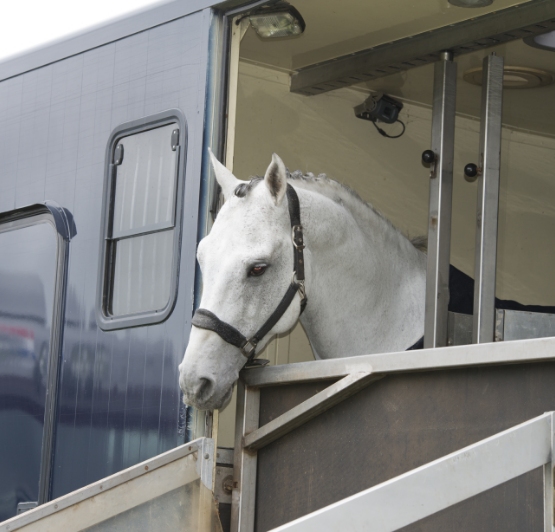
Three Points To Consider When Buying a Horse Trailer
There are always three main aspects of a horse trailer to consider when deciding what type of horse trailer, and that’s size, ventilation, and loading style. Once you have those figured out, other factors come next.
Horse Trailer Size
When it comes to the size of the horse trailer, taking measurements beforehand is key. Measure your horse from hoof to head, but also from nose to tail and shoulder to shoulder. Always consider extra room for your animals to move around when being transported, so they can keep their balance without scratching the walls of the trailer. The University of Maryland Extension recommends that your horse’s trailer be at least 10 inches taller than the height of the horse’s head when it is at rest, with an additional 3 inches on each side.
Make sure the stall space isn’t too short; otherwise, they’ll be sore and tired from having to balance themselves more. Having enough space for their head to move around is also crucial to keeping them comfortable and calm while transporting. A large-size trailer for the horse has another advantage: proper ventilation.
Horse Trailer Ventilation
Maintaining your calm and stress-free also depends on the ventilation of your trailer. An open design with windows and vents is better for horses in warmer climates, so they can be kept cool. Check to see if all these open and close properly before buying the trailer.
You can also install air conditioning on a horse trailer, although this can be an extra expense that many horse owners can’t afford. Nonetheless, it’s a great option in more extreme climates and a worthwhile investment in the long run.
Loading Style
As we saw above, the loading style needs to be addressed before deciding on the type of horse trailer to buy. Pick from slant load, straight load, or box stalls. Straight load trailers, which can be known as side-by-side trailers too, are common for two-horse bumper pull models, where the horses stand next to each other, looking forward.
Slant load trailers are the most used and load from the sides. You can load more horses this way, and their rumps are facing the others’.
Box stalls a less common, and they’re essentially barns on wheels since each horse is separated by partitions inside the trailer. While stock trailers are those without individual spaces for each horse.

